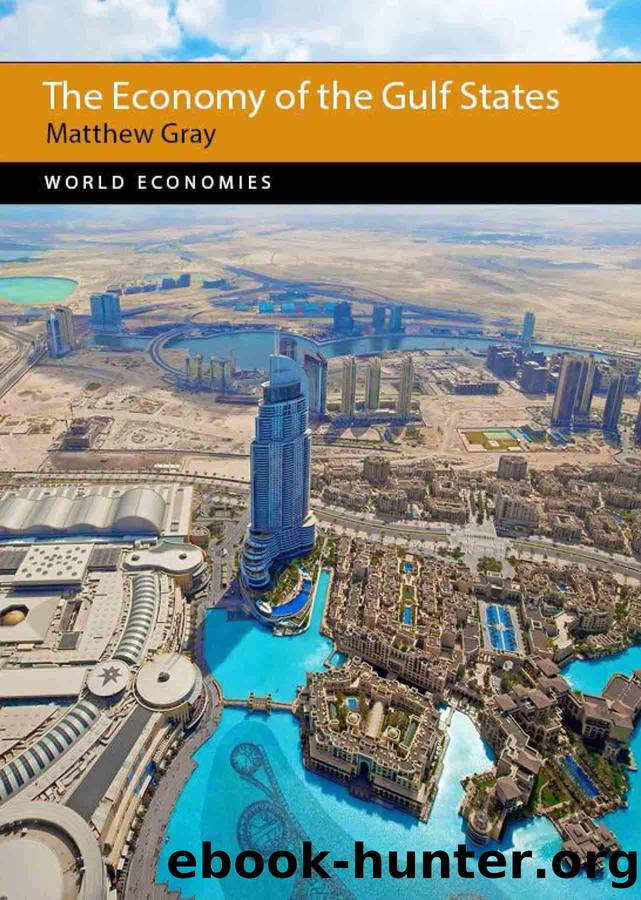The Economy of the Gulf States by Gray Matthew;

Author:Gray, Matthew;
Language: eng
Format: epub, pdf
Publisher: Book Network Int'l Limited trading as NBN International (NBNi)
Published: 2019-06-15T00:00:00+00:00
EXTERNAL DYNAMICS IN GULF POLITICAL ECONOMIES
A final aspect of Gulf politics â but a very important one â is the international dimension. As much as states have led the transformation processes in the region since the 1980s and 1990s, some forces have been beyond their control, or are the product at least in part of externalities. Two particular dynamics are notable in this respect: the forces and impacts of globalization, and the role of regional politics.
Much of the scholarly debate about globalization and its impacts is hampered by argument, including the definitional fuzziness of the concept itself, but in particular over the difficulty in pinning down and attributing its impacts in and on the Middle East and the Gulf. One definitional and explanatory approach has been to examine globalization not as a holistic and homogenous force, but to separate its characteristics and impacts into categories.66 There is an obvious economic angle to globalization, which is often given greatest focus by the beneficiaries of globalization. This includes free or freer movement of money, capital, goods, and people, with proponents of globalization often arguing for more liberal market structures. To its critics, conversely, the economics of globalization include political impacts such as reduced state power, less worker power, lower individual autonomy over oneâs economic life, and even exploitation. This perception of exploitation, or even the possibility of it, has seen some observers equate globalization with neoimperialism,67 substituting once direct political and social control with an indirect but powerful economic control. More commonly, arguments that globalization is a force for largely-negative economic neoliberalism are made.68
Similar arguments are made about another category, cultural and political globalization. There is an argument that globalization creates a âconvergenceâ69 of social and cultural dynamics, increasingly linking, relating, and impacting various communities across national and other boundaries. Ultimately, the argument goes, cultures become homogenized. The idea of globalization as âdeterritorializationâ70 is an aspect of this line of argument, too, âsignifying disjunctures between state borders and cultural communitiesâ.71 While sometimes assumed to be a negative thing, elements such as freer human movement, the adoption of new homelands and cultural practices, and the transfer of politics from one territory to another, are all potentially positive or at least more ambivalent than often assumed. Finally, globalization is typically defined or delineated in part by its technological and communication impacts. Technological changes since the 1980s, such as the dramatic expansion of the online world, new mobile phone technologies, and new forms of mass media have often transcended national boundaries, potentially allowing for changes in stateâsociety relationships and, some have argued, reducing state power and providing new and greater agency to individuals and communities.
The debate over globalization was late to focus on the Arab Gulf states, which provide a somewhat unique case study. The Gulfâs oil and gas wealth place it in a unique position, by no means central in the global economy, and in many ways on the margins of it, yet willing to engage with it and to accept economic change as a price for doing so.
Download
The Economy of the Gulf States by Gray Matthew;.pdf
This site does not store any files on its server. We only index and link to content provided by other sites. Please contact the content providers to delete copyright contents if any and email us, we'll remove relevant links or contents immediately.
International Integration of the Brazilian Economy by Elias C. Grivoyannis(74839)
The Radium Girls by Kate Moore(11621)
Turbulence by E. J. Noyes(7700)
Nudge - Improving Decisions about Health, Wealth, and Happiness by Thaler Sunstein(7242)
The Black Swan by Nassim Nicholas Taleb(6764)
Rich Dad Poor Dad by Robert T. Kiyosaki(6176)
Pioneering Portfolio Management by David F. Swensen(6079)
Man-made Catastrophes and Risk Information Concealment by Dmitry Chernov & Didier Sornette(5647)
Zero to One by Peter Thiel(5489)
Secrecy World by Jake Bernstein(4388)
Millionaire: The Philanderer, Gambler, and Duelist Who Invented Modern Finance by Janet Gleeson(4094)
The Age of Surveillance Capitalism by Shoshana Zuboff(3985)
Skin in the Game by Nassim Nicholas Taleb(3965)
The Money Culture by Michael Lewis(3847)
Bullshit Jobs by David Graeber(3830)
Skin in the Game: Hidden Asymmetries in Daily Life by Nassim Nicholas Taleb(3723)
The Dhandho Investor by Mohnish Pabrai(3560)
The Wisdom of Finance by Mihir Desai(3524)
Blockchain Basics by Daniel Drescher(3329)
